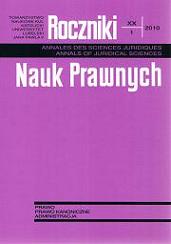Stosunki rodzice-dzieci po ustaniu małżeństwa (przez rozwód), a także uchyleniu wspólnoty małżeńskiej (przez separację)
Parents–Children Relations after Cessation of Marriage (by Divorce) and after Dissolution of Conjugal Community (by Separation)
Author(s): Stanislaw Leszek StadniczeńkoSubject(s): Law, Constitution, Jurisprudence
Published by: Towarzystwo Naukowe KUL & Katolicki Uniwersytet Lubelski Jana Pawła II
Keywords: family; parents–children relationships; divorce; separation; rodzina; stosunki rodzice–dzieci; rozwód; separacja
Summary/Abstract: The family is a social group of unique character and utmost social importance as it plays an eminent role in the personal development of a child who grows up in a given family. Disruption of the family leads to so-called “spiritual orphanhood” and “social orphanhood” of the offspring. Therefore, it is immensely important to regulate the parents-children relationship after cessation of marriage (by divorce) and also after the conjugal community has been dissolved (by separation). The relations between parents and children constitute interpersonal experiences based on communication and responsibility. After cessation of marriage, and also in the case of separation, these relations change. The substance of a particular legal relationship holding between parents and children is chiefly the parental power. Moreover, parents-children relations based on consanguinity entail an obligation to support each other, the right of parents to determine the names for their children, the obligation of children to contribute financially to the family budget and to help run the household, and the right to personal contact between parents and their children. This article details particular elements of the parents-children relationship following divorce and separation. New legal regulations were made public on 6 November, 2008, entering into force on 13 June, 2009. As regards the parents-children relationship after the marriage has ceased and in the case of separation, both Polish Family Law and international legal order have to be respected. Poland is a party to numerous international, multilateral agreements. When dealing with foreign elements, one has to observe private international law, which regulates a collision of interests. Moreover, rich international standards, discussed in this work, cater for the parents-children relationship after divorce or separation have occurred. In the Polish Family Law the institution of divorce is an exception to the principle of marriage permanence. So is separation, which is an autonomous institution of Family Law. These institutions formally impose a legal order on the personal and property matters of a natural person. However, divorce or separation are not permissible if they should endanger the well-being of their common and minor children. Indeed, all solutions (both actual and legal ones), prior to, during and after the cessation of marriage, should be considered in the light of fundamental principle of a child’s interest. This precept sets trends in the development of legal regulations.
Journal: Roczniki Nauk Prawnych
- Issue Year: 20/2010
- Issue No: 1
- Page Range: 39-61
- Page Count: 23
- Language: Polish

